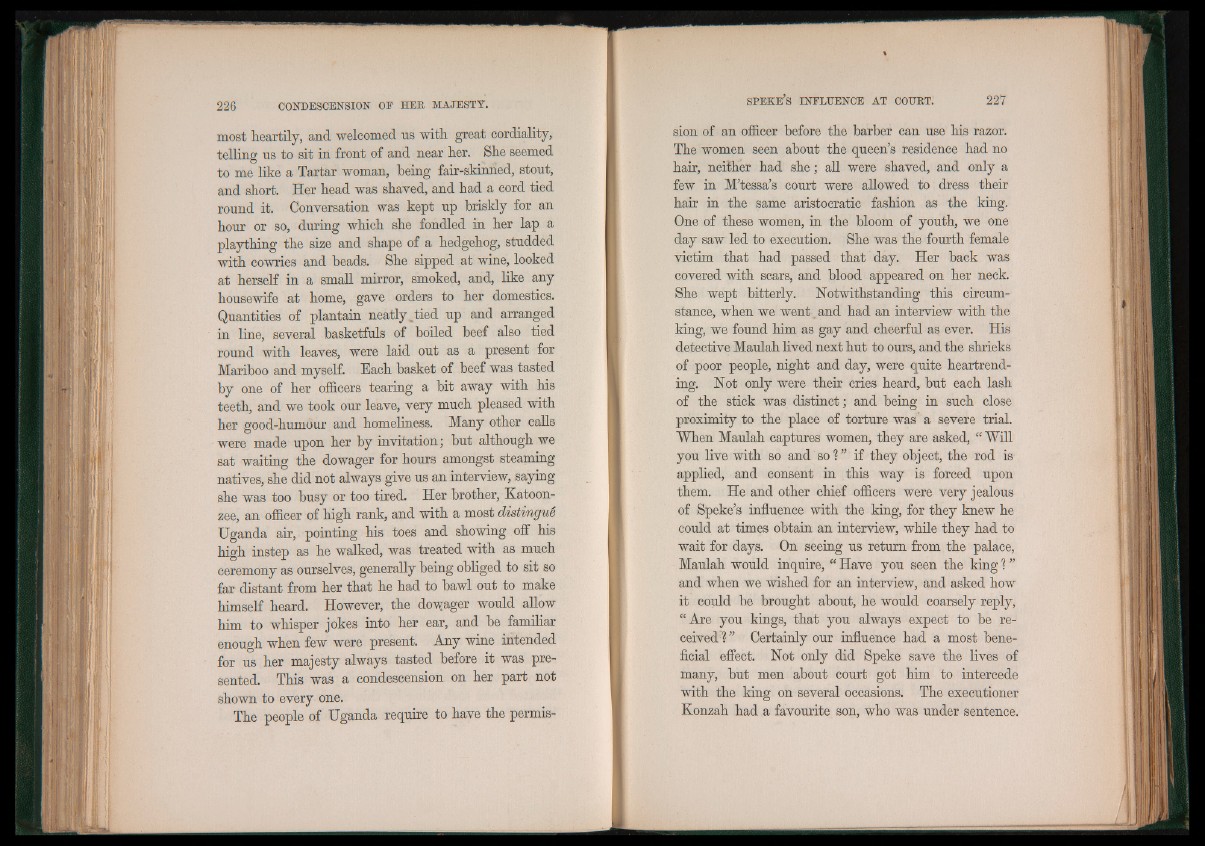
most heartily, and welcomed us with great cordiality,
telling: us to sit in front of and near her. She seemed
to me like a Tartar woman, being fair-skinned, stout,
and short. Her head was shaved, and had a cord tied
round it. Conversation was kept up briskly for an
hour or so, during which she fondled in her lap a
plaything the size and shape of a hedgehog, studded
with cowries and heads. She sipped at wine, looked
at herself in a small mirror, smoked, and, like any
housewife at home, gave orders to her domestics.
Quantities of plantain neatly,tied up and arranged
in line, several basketfuls of boiled beef also tied
round with leaves, were laid out as a present for
Mariboo and myself. Each basket of beef was tasted
by one of her officers tearing a bit away with his
teeth, and we took our leave, very much pleased with
her good-humour and homeliness. Many other calls
were made upon her by invitation; but although we
sat waiting the dowager for hours amongst steaming
natives, she did not always give us an interview, saying
she was too busy or too tired. Her brother, Katoon-
zee, an officer of high rank, and with a most distingue
Uganda air, pointing his toes and showing off his
high instep as he walked, was treated with as much
ceremony as ourselves, generally being obliged to sit so
far distant from her that he had to bawl out to make
himself heard. However, the dov^ager would allow
him to whisper jokes into her ear, and be familiar
enough when few were present. Any wine intended
for us her majesty always tasted before it was presented.
This was a condescension on her part not
shown to every one.
The people of Uganda require to have the permission
of an officer before the barber can use his razor.
The women seen about the queen’s residence had no
hair, neither had she; all were shaved, and only a
few in M’tessa’s court were allowed to dress their
hair in the same aristocratic fashion as the king.
One of these women, in the bloom of youth, we one
day saw led to execution. She was the fourth female
victim that had passed that day. Her back was
covered with scars, and blood appeared on her neck.
She wept bitterly. Notwithstanding this circumstance,
when we went, and had an interview with the
king, we found him as gay and cheerful as ever. His
detective Maulah lived next hut to ours, and the shrieks
of poor people, night and day, were quite heartrending.
Not only were their cries heard, but each lash
of the stick was distinct; and being in such close
proximity to the place of torture was a severe trial.
When Maulah captures women, they are asked, “ Will
you live with so and so?” if they object, the rod is
applied, and consent in this way is forced upon
them. He and other chief officers were very jealous
of Speke’s influence with the king, for they knew he
could at times obtain an interview, while they had to
wait for days. On seeing us return from the palace,
Maulah would inquire, “ Have you seen the king ? ”
and when we wished for an interview, and asked how
it could be brought about, he would coarsely reply,
“ Are you kings, that you always expect to be received?”
Certainly our influence had a most beneficial
effect. Not only did Speke save the lives of
many, but men about court got him to intercede
with the king on several occasions. The executioner
Konzah had a favourite son, who was under sentence.